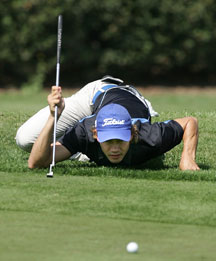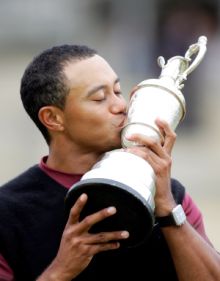 The minute Phil Mickelson or any other big-name player wins a tournament – any tournament – the media is abuzz with questions whether or not that player can overtake Tiger Woods in the World Golf Rankings.
The minute Phil Mickelson or any other big-name player wins a tournament – any tournament – the media is abuzz with questions whether or not that player can overtake Tiger Woods in the World Golf Rankings.
While Phil has probably exceeded his short-range goals with swing-coach Butch Harmon, there remain many obstacles between Phil and the number-one ranking. Outside of Phil Mickelson there is nobody who seems to have the consistency to challenge Woods week in and week out. While there is a ton of potential on Tour, potential does not a winner make.
Here’s my best stab at why Tiger is a lock as the world number one for a long time to come…
Number Five: 20.49
 Woods is currently 11.15 points ahead of Phil, with 20.49 Official World Golf Ranking points to Phil’s 9.34. Tiger’s lead is his own moat with crocodiles. 11 World Golf Ranking Points is a substantial lead (it is, after all, more points than Phil even has). You could split Tiger’s points total down the middle and Tiger #1 and Tiger #2 would both lead then third-place Phil Mickelson by nearly a full point. If Tiger stopped playing today, it would still take a very long time for anyone to overtake, and Tiger ain’t done just yet.
Woods is currently 11.15 points ahead of Phil, with 20.49 Official World Golf Ranking points to Phil’s 9.34. Tiger’s lead is his own moat with crocodiles. 11 World Golf Ranking Points is a substantial lead (it is, after all, more points than Phil even has). You could split Tiger’s points total down the middle and Tiger #1 and Tiger #2 would both lead then third-place Phil Mickelson by nearly a full point. If Tiger stopped playing today, it would still take a very long time for anyone to overtake, and Tiger ain’t done just yet.
Tiger’s World Golf Ranking in 2000 was 29.40. Wow. Ernie Els was in second place with 11.65 that year and hasn’t fared better than 10.98 since. Vijay’s nine-win career year in 2004 vaulted him to first at 12.79 but then fell back to 9.78 in 2005.
The point I’m trying to make is that it has been a long time since someone other than Tiger Woods has been in the mid- to high-teens in the World Golf Rankings. Greg Norman in 1995 (21.93), Nick Price in 1994 (21.30), or Nick Faldo in 1993 (20.65) or 1992 (23.54) had the game to do it but those kind of numbers have been strangely absent since Tiger burst onto the scene.
Number Four: Show Me the Next Woods
 It took a surging Vijay Singh (with nine wins) to overtake a Tiger Woods in the midst of a swing change. Singh’s prolific 2004 was an anomaly. A prolific winner of Tiger’s caliber has yet to assert himself.
It took a surging Vijay Singh (with nine wins) to overtake a Tiger Woods in the midst of a swing change. Singh’s prolific 2004 was an anomaly. A prolific winner of Tiger’s caliber has yet to assert himself.
Every time Phil Mickelson wins an event the media whips themselves into a froth about how it won’t be long before we’ll have a legitimate challenger to Woods. While I think Phil is improving under Butch Harmon, he hasn’t proved himself head-to-head with Tiger.
Butch Harmon is right in saying that changing Phil’s swing might be the easy part of the Mickelson equation. Phil’s propensity to try to hit impossible shots and hit it really long hasn’t changed. The “Thrill” part of Phil might yet prevent him from ever getting to number one.
With my apologies to Mr. Els I don’t believe that he is getting to number one any time soon. His plan to challenge Tiger and the best player in the world hasn’t materialized in any way. Els’ last victory on the PGA Tour was in 2004 and he can’t expect to challenge Tiger unless he starts winning on this side of the pond again.
Number Three: Tiger Will Find a Way to Improve
 Everyone has been all over Tiger’s driving lately as they were prior to his winning seven in a row and a total of eight in 2006. We all know that Tiger loves to work on his game and he’ll be actively looking for a way to hit his driver in the short stuff more often.
Everyone has been all over Tiger’s driving lately as they were prior to his winning seven in a row and a total of eight in 2006. We all know that Tiger loves to work on his game and he’ll be actively looking for a way to hit his driver in the short stuff more often.
Tiger may look for weaknesses in other players, but the scrutiny he places on his own game is more severe than anyone else’s. Tiger’s frustration with driver has to be substantial. He’s undergone a couple of substantial swing tweaks in an effort to get better and, like all golfers do, he’ll be looking for a way to shore up his weaknesses. A stronger Tiger looks good to only one person: Tiger.
If it’s taken Phil only three weeks to get better with Harmon, we can hazard a guess that a few tweaks and Tiger will be ready to reel off another seven before the year’s out. And remember one thing: Tiger’s already won three times this year and the eight times last year with a faulty driver. Even Tiger’s bad driving gets him more wins than anyone else in the world.
Number Two: And Yet He Wins…
 Anyone who hopes to become the number one player in the next five to ten years has this against them: Tiger will keep winning. Anyone who wants to catch Tiger may well have to do so by winning six times a year for the next eight years because Tiger may well win four or more tournaments per year for a long time.
Anyone who hopes to become the number one player in the next five to ten years has this against them: Tiger will keep winning. Anyone who wants to catch Tiger may well have to do so by winning six times a year for the next eight years because Tiger may well win four or more tournaments per year for a long time.
Say what you want, but Tiger Woods isn’t going to fall in the World Golf Rankings anytime soon. What is lost on anyone hyping the number-one hopefuls is that Tiger is still winning. Say what you will about his driving and his ability to step on the gas down the stretch, the man simply continues to win. Wins mean points and nobody wins as much as Woods.
Golf is, and always will be, about scoring. The guy with the fewest strokes at the end of a tournament wins it and Tiger knows it. The prettiest swing and the most complete game won’t get you anywhere unless you can get the ball into the cup more quickly than your competitors. Time and time again Tiger has proven that he can score. He’ll continue to do that.
Tiger had a lackluster Players, but he typically doesn’t play well there anyway. Consider his final-round score at the Players and you know he’s still got it.
Tiger nearly has a fifty percent winning average in 2007 and was nine for twelve prior to the Players. If Rory Sabbatini is right and Tiger is more beatable than ever, then why doesn’t someone go ahead and beat him? There is too much talk and too little action on the PGA Tour these days.
Number One: History Says…
 In 10 years Tiger has accumulated an obscene 57 PGA Tour wins and he shows no signs of slowing down. Remember that golf is an up and down game. Some days you’re on and some days you’re off. That has been as true for Tiger as anyone. The difference is that Tiger Woods is still capable of winning when he’s having an off week. In a recent survey, Luke Donald was asked who the second best player in the world was. His answer? “Tiger’s B Game.”
In 10 years Tiger has accumulated an obscene 57 PGA Tour wins and he shows no signs of slowing down. Remember that golf is an up and down game. Some days you’re on and some days you’re off. That has been as true for Tiger as anyone. The difference is that Tiger Woods is still capable of winning when he’s having an off week. In a recent survey, Luke Donald was asked who the second best player in the world was. His answer? “Tiger’s B Game.”
History says that Tiger Woods is the best of his generation by a long shot. Time and time again Tiger finds a way to get the job done. His amateur career, 12 majors, and 57 PGA Tour victories all speak volumes. Remember that he’s barely 31. A golfer’s thirties are often when they peak. If Woods is anything like Singh, he’ll get even better in his forties.
Woods’ resumé speaks volumes about his ability to continue his prolific career for a couple of more decades.
Photo Credit: David Cannon, Getty Images at ErnieEls.com, PE.Com, PGA, Unknown, Getty Images.

Only a multiple major winner with a limited schedule can rack up that many average points…which leaves Tiger in the no. 1 slot for a while.
another factor which you have to figure into the equation is tiger and missed cuts, he doesn’t miss many. that equals points every time he tees it up. and even if doesn’t win, he is usually pretty close to the lead, that, too, equals points. how do you overcome that? you don’t. therefore, tiger is number one as long as he is playing.
Now let’s see, Tiger has 57 victories at age 31. Let’s say he averages about 5 victories a year. If a golfer’s peak is often in his thirties, as Jeff says, let’s say, just for the sake of argument that Tiger won’t get better in his thirties and he won’t get worse; just more of the same. Say he wins a couple more times this year and continues to average 5 wins a year for the following nine years. Throw in an average of about one major a year. What do we have? Well, Tiger would have 104 PGA wins and around 21 majors, maybe more. Does anyone come close to that during Tiger’s career? Answer: very unlikely. This fellow’s a once in a lifetime phenom. My advise to everyone: enjoy the ride while it lasts, for we’re unlikely to see anything else in golf like Mr. Woods in our lifetime.
So where does that leave the question of who’s the best in any given year during the period that marks Tiger’s career? Well, an argument could be made that Tiger’s dizzying numbers makes such an annual ranking irrelavent. I suppose there will be years during which Tiger, for any number of reasons, won’t win five or more times and may not be ranked number one. But in the big picture, unless something tragic occurs, number one in any given year just doesn’t seem as important as it once did when the competition seemed a little more closely ranked.